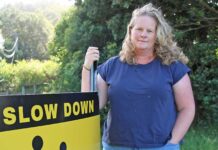This week we were gobsmacked when the agency that has been supplying us with Waiheke’s liquor licensing notices for more than 20 years informed us we would no longer be getting public notices for liquor licensing on the island.
As of, well, this week.
The agency said in their email: “You may have heard that recently Stuff announced it will be closing its Auckland community papers. Subsequent to this, the Auckland Council has taken the decision to require the public notices for alcohol licences to be published online only.
“Unfortunately this means we won’t be publishing any further notices in Gulf News, or other papers. They will solely be published on our website. It’s a significant change for us as we’ve been doing this for 20 years. As they say, change is the only constant.”
None of our own local board representatives or our ward councillor say they had heard of anything about this; nor did they think it was anything other than bonkers.
Considering the impact local liquor licenses have on communities, expecting people to check a website ‘just in case’ there ‘might’ be an alcohol licence being requested beggars belief.
It is shameful that Auckland Council has used the re-structure at Stuff to further distance themselves from the communities they serve and that are directly affected by the decisions council makes.
Since it does not appear to be a decision coming through our elected representatives, it seems to be a change council employees are initiating themselves.
And how can an organisation that is run on public money, not just our rates but every other tithe and tax they can think of, make decisions for itself on its obligations to be transparent to those people? Transparency and governance by and for ratepayers and citizens has been ruthlessly suppressed for three decades in Auckland’s sequence of supercity structures.
Ironically, on Tuesday a late night email from a fellow editor gave me inside intel on what these ‘online’ companies were charging. And it was a lot more than our own modest advertising rates.
And don’t worry, you too will be able to sign up to get email notifications every time a new license is applied for. Sound fun?
A little self-review might be required?
Furthermore, the train-wreck that was Stuff’s abandonment of such venerable local mastheads serving tens of thousands of residents and ratepayers as the North Shore Times Advertiser and the Rodney Times, goes against a trend back to printed rather than online content.
This week there was a rather chilling story on RNZ’s news feed titled ‘How a local website was hijacked and filled with AI-generated ‘coherent gibberish’. The story conjured up an opening scene from a horror film, or a John Campbell expose. “Something odd has been going on in Whakataki Valley east of Mount Aspiring National Park, it is claimed.
“Today, it’s officially been closed to overnight stays – and the Department of Conservation isn’t saying exactly why.”
It all sounded really rather interesting but was also completely untrue.
So even AI has worked out that local news is important to people and they will give it their attention.
It just forgot to learn that it had to be true.
Hyper-local and extremely hard working independent locally run community newspapers are re-sprouting around the country as the bigger national media organisations shed their smaller mastheads and people’s thirst for trustworthy news of relevance and importance to them is not met anywhere else.
So far, there is little sign of interest by courageous publishers wanting to re-establish versions of these venerable mastheads even on a smaller scale, which probably reflects the depredations on the industry’s once-adequate income stream from paid advertising. That once golden revenue stream is now filched by non-tax paying American tech giants and disdained by both local and central government which once, but no longer, believed communities should be glued together by networks of constructive information.
Communities thrive when their established networks of communication are sound. But nature abhors a vacuum. If communication is the glue that provides band aids to vital community conversations and moves them forward with purpose, then a lack of it fosters suspicion, distrust and apathy.
Community papers are a vital link in getting information from local government to the people they represent. How many people will regularly go and check a council or third party website for the possibility of a public notice that affects them? That is quite literally what local news gatherers curate and bring together for people.
Newspaper editors being what they are, there will be numerous Official Information Act applications for background on what council is spending and where, especially when it means spending local rates with international companies, at the expense of local media which has demonstrated penetration to the audiences they want to reach.
At the same time, and without a shred of irony, council officials are busy emailing those same local papers bemoaning the fact that they have so few candidates stepping forward to fill local board roles across the region and glooming over the lack of appetite for the local authority elections in October from the wider public.
Well, that vacuum again – and we can probably find something rather amusing to do with it. • Merrie Hewetson






